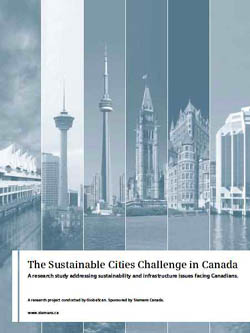
Energy pricing key to sustainability of Canada’s big cities
Staff
General DPN The Sustainable Cities Challenge, hosted at the Royal York Hotel in Toronto on May 18th, 2010, featured a panel discussion from industry experts as well as a keynote speech by Peter Robinson, CEO of the David Suzuki Foundation.
The Sustainable Cities Challenge, hosted at the Royal York Hotel in Toronto on May 18th, 2010, featured a panel discussion from industry experts as well as a keynote speech by Peter Robinson, CEO of the David Suzuki Foundation.
The panel was moderated by the CBC TV’s Wendy Mesley and the panelists included Roland Aurich, president and CEO of Siemens Canada, Thomas Homer-Dixon, the CIGI chair of Global Systems, Balsillie School of International Affairs professor, Centre for Environment & Business, University of Waterloo, Mike Pedersen, group head, Corporate Operations, TD Bank Financial Group co-chair, Greening Greater Toronto Task Force, and Tom Rand, practice lead, Cleantech and Physical Sciences MaRS Discovery District.
During the discussion, the panel stressed the fact that pricing was the biggest determining factor that would affect a change towards a more sustainable Canadian lifestyle, saying that the price must be right in order for Canadians to consume more sustainable products.
WATCH BELOW: Sustainble Cities Challenge conference highlights
The panel also agreed that technology is not the “magic bullet” when it comes to creating a sustainable Canadian city, and that if it was, the problem would be solved already. Homer-Dixon spoke about how we will begin to see a massive increase in the cost of energy in the coming decades and how Canadians need to become more educated on the topic of sustainability. Tom Rand spoke of how we need to “kick our fossil fuel habit,” and he believes that although it may be inconvenient, it is still a possibility for Canadians.
The conference was held to announce the release of a Siemens study which examined several different infrastructure areas in Canada.
 The study, entitled The Sustainable Cities Challenge in Canada, was commissioned by Siemens Canada in conjunction with the David Suzuki Foundation and was conducted by GlobeScan in 12 of Canada’s largest cities.
The study, entitled The Sustainable Cities Challenge in Canada, was commissioned by Siemens Canada in conjunction with the David Suzuki Foundation and was conducted by GlobeScan in 12 of Canada’s largest cities.
It reflects the views of a sample of experts on issues related to infrastructure for cities from government, the private sector, academia, and non-governmental organizations.
Focusing on key infrastructure areas – transportation, energy, water and waste water, healthcare, and safety and security – the study reveals that experts are divided on how effectively their cities are adopting sustainable infrastructure solutions.
Less than a majority (41%) think their cities’ leaders recognize the vital role that infrastructure decisions can play in protecting the environment and addressing climate change. And nine in ten experts see a high need for investment in transportation infrastructure – far greater than other areas.
“At Siemens, we are very interested to know what Canadian city leaders and key stakeholders are thinking, which is why we undertook and invested in this study. We want to engage Canadians in a dialogue about sustainable cities, increase awareness of the subject and encourage more people to think about the future today," said Aurich.
Results of the study add critical information to the ongoing dialogue initiated by Siemens to address the key challenges facing cities.
Building on the themes currently dominating that discussion, experts who participated in the study say that transportation infrastructure faces a “perfect storm” of problems in the coming years. Six in ten experts, especially those in Atlantic Canada and the Prairies, say that old or obsolete infrastructure is the biggest challenge facing their respective cities. Lack of long-term strategic planning and inadequate capacity are also considered to be factors contributing to the problem.
Experts also cite transportation infrastructure as a key factor affecting a city’s competitiveness. When asked to name which type of infrastructure is the most important in attracting investment to their cities, 63% of experts point to transportation. Yet only one-half believe that when making infrastructure investments, their cities place high importance on making the city competitive to attract private investment.
Similarly, the study reveals that while the subject of sustainable infrastructure is accepted, implementation is lagging. Only four in ten experts (mainly in government) think that their cities recognize the vital role that infrastructure decisions can play in protecting the environment and addressing climate change. Three in ten disagree, suggesting a lack of awareness of the link between infrastructure and the environment.
“This report demonstrates the urgent need for Canadian cities to examine the crucial role forests, wetlands and farmlands can play in providing truly ‘green’ infrastructure services,” said Peter Robinson, CEO of the David Suzuki Foundation. “On the path towards sustainability, these cities will need to invest in the protection of this natural capital to ensure we all continue to benefit from the essential ecological services nature provides, like cleaning our air and water and regulating the climate.”
Key Highlights
Experts’ views on how quickly and efficiently their cities will adopt sustainable infrastructure solutions differ widely across the country. In Vancouver, 71% rate their city among the best at adopting green solutions. Those in Quebec are at the other end of the spectrum, with almost no one rating their city above average.
In terms of environmental challenges, the study shows that experts point first to transportation-related issues (20%) and water/waste water (19%). These issues are followed by urban sprawl (14%) and atmospheric issues such as air pollution and climate change (11%). Across regions there is differentiation: experts in Quebec and British Columbia perceive transportation to be the most serious, while in Ontario and Prairie cities, water challenges hold the number one position. Experts in Atlantic Canada consider both transportation and water to be equally serious, while urban sprawl is the most serious for experts in Alberta cities.
The study shows that aging water infrastructure and poor public awareness are other major challenges that cities must face in the near future.
www.siemens.ca
www.globescan.com
www.marsdd.com
www.greeninggreatertoronto.ca
www.balsillieschool.ca
www.davidsuzuki.org
For more DPN News click here
